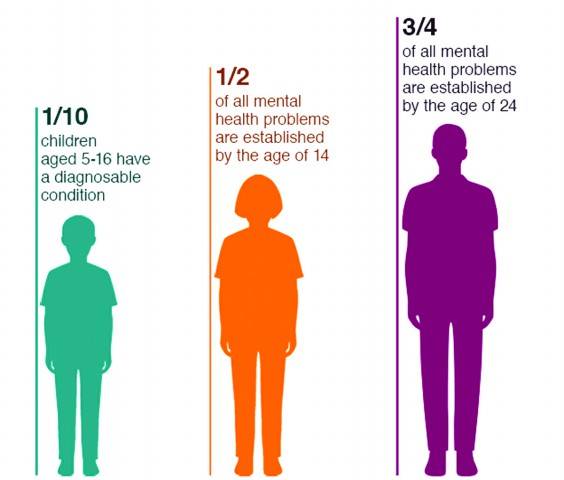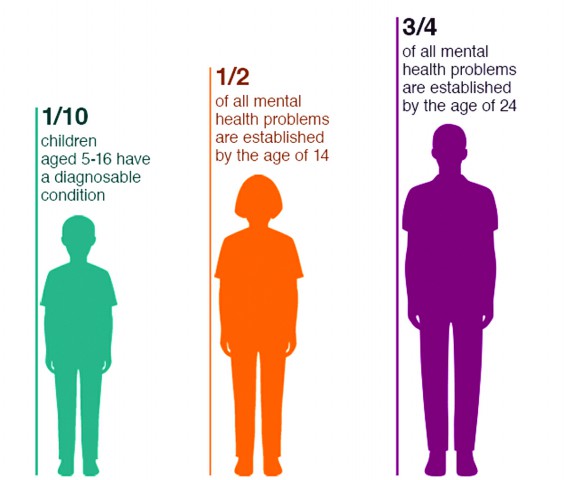
Granted, we don’t need a specific week dedicated to contemplating the mental health and well-being of our children. However, one definite bonus of having weeks and days dedicated to important issues is that that it gives us the time and space to meaningfully reflect on something crucially important. Otherwise, they run the risk of fading into the humdrum of everyday life. This week being Children’s Mental Health Week has encouraged me to pause and consider how I approach the mental wellbeing of my own children and become more cognizant of my patterns in our relationship. Let’s talk about this.
Firstly, it’s useful dismantle the painfully unhelpful notion that only some people have ‘mental health’ to reckon with. This is both fallacious and ludicrous - mental health needs to be a priority at all times and there are definitely things we can do as parents, carers, teachers and well-wishers to ensure that our children stay mentally well: positive, creative, open minded, communicative, balanced, wholesome and hopeful. Can you tell I am daunted by the task? There are hundreds of books and websites which cover theoretical ground brilliantly on this, but from experience, here are five things that have helped me in my role as parent, teacher, and care giver. I have been telling myself to:

It’s probably worth reiterating that these are notes to myself that I hope are worth sharing, as I am in no position to be prescriptive about parenting. I assure you, I certainly have more questions than answers when it comes to raising our children, “the sons and daughters of Life’s longing for itself.”

My son recently sent me a message on my phone from his tablet. This was curious because he was sitting right next to me at the time. When I questioned why he had chosen to text instead of speaking to me directly, he responded very matter-of-factly: “You are much more likely to listen to me straight away way if I message you”
Firstly, it’s useful dismantle the painfully unhelpful notion that only some people have ‘mental health’ to reckon with. This is both fallacious and ludicrous - mental health needs to be a priority at all times and there are definitely things we can do as parents, carers, teachers and well-wishers to ensure that our children stay mentally well: positive, creative, open minded, communicative, balanced, wholesome and hopeful. Can you tell I am daunted by the task? There are hundreds of books and websites which cover theoretical ground brilliantly on this, but from experience, here are five things that have helped me in my role as parent, teacher, and care giver. I have been telling myself to:

- Hold, don’t heal: The credit for this approach belongs to a brilliant meditation teacher I have recently encountered. As grown-ups our instinct to fix things including the moods, feelings, and emotions of our children, is a strong one. I have realised that there is a real benefit in giving our children time and space to experience a full range of feelings instead of intervening too quickly. While naturally we wish to be the balm that heals those most precious to us, we can run the risk of brushing away are children’s thoughts and fears too quickly by acting right away. Sometimes, it’s work letting emotions linger while we serve as a reassuring presence. This has taken me great patience to cultivate, the temptation of offering to buy off their sadness with something promptly deliverable on Amazon Prime being somewhat strong!
- Listen, always. And validate: Let me come clean before anyone else. There have been countless times when I have casually told my children, in response to their expression of sadness, “You’re not sad, you have no reason to be! Think of all those without food and shelter and be grateful for what you have.” Or perhaps, “You can’t possibly dislike him! He’s your Uncle and a lovely person!” Let’s be honest, this is tantamount to telling a child that what they are experiencing is first, not real and second, not worth validating. It is a fundamental human right to have our feelings acknowledged and valued. I have learnt that just the simple act off acknowledging my children’s doubts, fears, frustrations, or anxieties puts them at some ease. Someone is listening. Someone gets it. Sometimes just that is enough.
- Put your phone down: my son recently sent me a message on my phone from his tablet. This was curious because he was sitting right next to me at the time. When I questioned why he had chosen to text instead of speaking to me directly, he responded very matter-of-factly: “You are much more likely to listen to me straight away way if I message you.” Once I recovered from the embarrassment of this (most accurate) observation, I now put my phone down and look at my children when they speak to me, irrespective of what they have to say. Typing and flicking through my device whilst they speak to me instantly suggests that my mind is elsewhere. I wouldn’t do this to my colleagues; how can I justify doing it to my children? Sometimes it’s the little things.
- Hug, cuddle, pat: there is amazing science behind this - physical affection towards anyone, child or grown-up, has the power to instantly soothe and comfort, much in the same way as it does an infant child. The reality is that we all need to be hugged and held more - the release of oxytocin provided by a lingering hug has more benefits than many medicines! I have noticed that when I hold my 12-year-old daughter in a tight embrace, for no reason at all other than the wish to be close, she wants to cling on just a little longer. How sadly ironic is the idea that to grow up we sometimes feel the need to forego our most innate needs?
- Don’t make love conditional: conditional love is surely an unfathomable paradox. Surely you either love someone, which is always without conditions, or you don’t. I know that far too many children are fearful of failing and by consequence letting their parents down. I know my own children can feel more loved when they have made us proud. Ironically, they need that love so much more or when they have, allegedly, let us down or feel they have failed us. There is of course is fine balance to be struck here and it’s not always an easy one. As the people who our children are accountable to, we don’t wish to encourage poor behaviour or low standards. However, there is nothing to stop us from putting compassion at the heart of our dealings with young people. ‘Kindness first’ always works. As a bonus, a relationship built on mutual respect and compassion allows lines of communication to stay open and I want my children to be able to talk to me about anything they wish to. And when it comes to mental health, sharing and communicating are the most powerful things we can do.
It’s probably worth reiterating that these are notes to myself that I hope are worth sharing, as I am in no position to be prescriptive about parenting. I assure you, I certainly have more questions than answers when it comes to raising our children, “the sons and daughters of Life’s longing for itself.”


